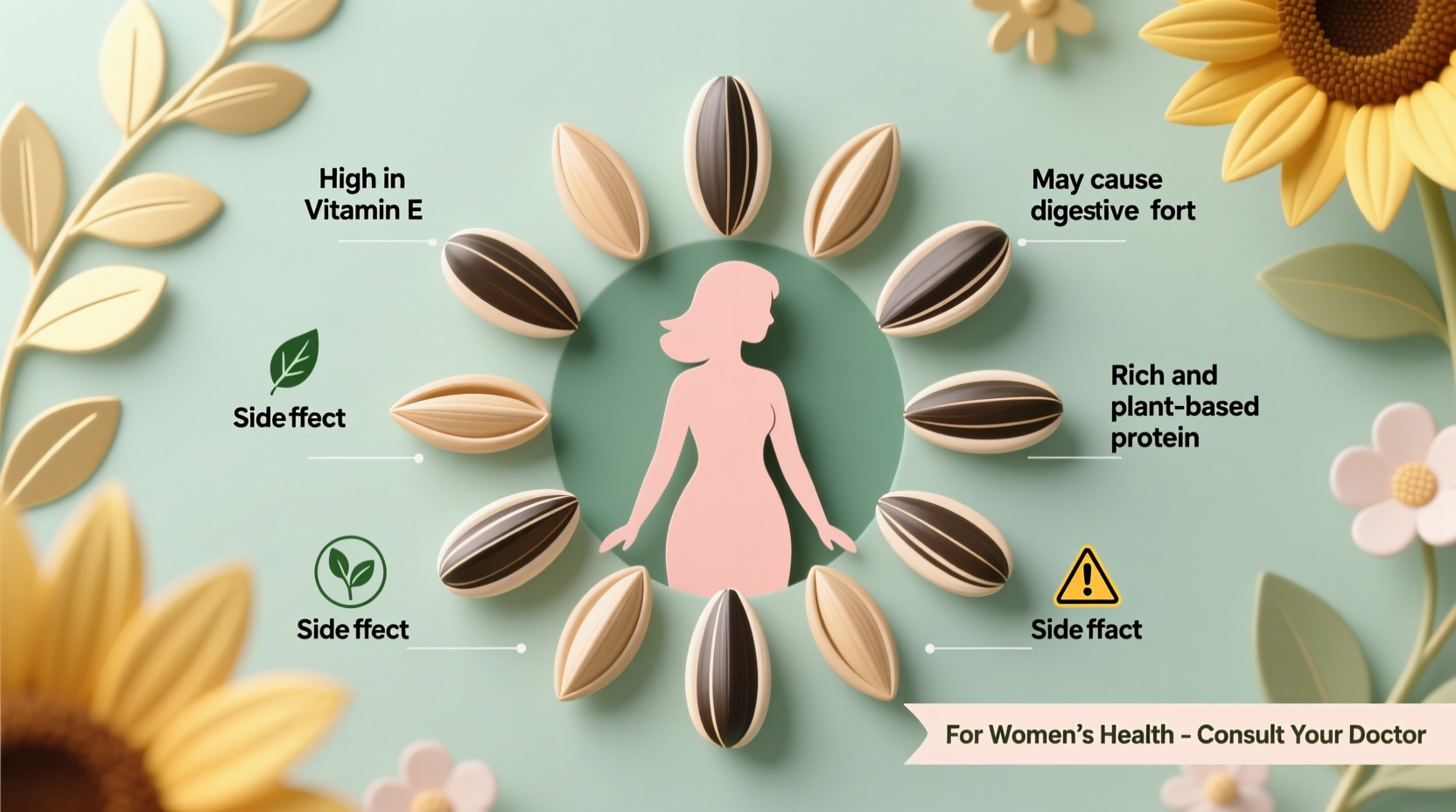Curious about how this popular snack affects women's health? You're not alone. Many women enjoy sunflower seeds for their satisfying crunch and nutritional benefits but wonder if there are gender-specific concerns. This guide delivers evidence-based information about potential side effects, safe consumption levels, and who should exercise caution—so you can make informed choices about incorporating these nutrient-dense seeds into your diet.
Understanding Sunflower Seeds: Nutrition Profile
Sunflower seeds pack a powerful nutritional punch. A single ounce (28g) serving provides:
| Nutrient | Amount per Ounce | Daily Value % |
|---|---|---|
| Calories | 165 | 8% |
| Protein | 5.8g | 12% |
| Fiber | 3g | 11% |
| Vitamin E | 7.4mg | 49% |
| Magnesium | 38mg | 9% |
| Selenium | 19mcg | 35% |
According to the National Institutes of Health, these nutrients support heart health, reduce inflammation, and provide antioxidant protection—benefits that apply to both men and women.

Common Side Effects Women Should Know
Allergic Reactions: Rare But Serious
While sunflower seed allergies affect only about 0.1% of the population according to American Academy of Allergy, Asthma & Immunology, women experiencing symptoms like hives, swelling, or difficulty breathing after consumption should seek immediate medical attention. Unlike some food allergies that develop in childhood, seed allergies can emerge in adulthood.
Digestive Discomfort from Overconsumption
The high fiber content that makes sunflower seeds beneficial can cause issues when consumed excessively. Women regularly eating more than 3 ounces daily may experience:
- Bloating and gas
- Abdominal cramping
- Diarrhea or constipation
The FDA recommends gradually increasing fiber intake and drinking adequate water to minimize these effects.
Specific Concerns for Women's Health
Thyroid Function Considerations
Sunflower seeds contain goitrogens—compounds that may interfere with thyroid function when consumed in very large quantities. For women with existing thyroid conditions, particularly hypothyroidism, this warrants attention:
| Thyroid Status | Safe Consumption Level | Precautions |
|---|---|---|
| Healthy thyroid | Up to 2 oz daily | None needed |
| Subclinical hypothyroidism | 1 oz daily | Monitor thyroid levels regularly |
| Diagnosed hypothyroidism | Consult physician | May need to limit or avoid |
Research published in Thyroid Research Journal indicates that moderate consumption (1-2 ounces) generally doesn't affect thyroid function in healthy individuals, but those with thyroid conditions should consult their healthcare provider.
Hormonal Interactions
Sunflower seeds contain phytoestrogens, plant compounds with weak estrogen-like effects. Current research, including a 2018 NIH study, suggests these compounds don't significantly impact hormone levels at normal consumption levels. However, women with estrogen-sensitive conditions should discuss with their doctor.
When Sunflower Seeds Become Problematic: Context Boundaries
Not all women need to worry about sunflower seed side effects. Understanding your personal health context is crucial:
- Pregnancy and breastfeeding: Sunflower seeds are generally safe during pregnancy when consumed in moderation (1-2 oz daily). Their folate content supports fetal development, but avoid salted varieties with excessive sodium.
- Medication interactions: High vitamin K content may interfere with blood thinners like warfarin. Women taking these medications should maintain consistent intake levels and consult their physician.
- Autoimmune conditions: Some women with autoimmune disorders report symptom exacerbation with seed consumption, though research is limited. Track your personal response.
Maximizing Benefits While Minimizing Risks
You don't need to eliminate sunflower seeds to stay safe. Follow these practical strategies:
Smart Consumption Guidelines
- Stick to 1-2 ounce servings (about 1/4 to 1/2 cup)
- Choose raw or dry-roasted over oil-roasted varieties
- Opt for unsalted versions to control sodium intake
- Soak seeds overnight to reduce phytic acid content
Preparation Methods That Reduce Concerns
How you prepare sunflower seeds affects their impact:
- Soaking: Reduces phytic acid by up to 50%, improving mineral absorption
- Sprouting: Further decreases goitrogenic compounds while increasing nutrient availability
- Light roasting: Preserves nutrients better than deep frying
When to Consult Your Healthcare Provider
While most women can safely enjoy sunflower seeds, contact your healthcare provider if you experience:
- Persistent digestive issues after consumption
- Skin reactions or respiratory symptoms
- Changes in thyroid medication effectiveness
- Unexplained fatigue or weight changes that coincide with increased seed consumption
Keep a food diary noting your sunflower seed intake and any symptoms for 2-4 weeks before your appointment. This helps your provider determine if there's a connection between your symptoms and consumption.











 浙公网安备
33010002000092号
浙公网安备
33010002000092号 浙B2-20120091-4
浙B2-20120091-4